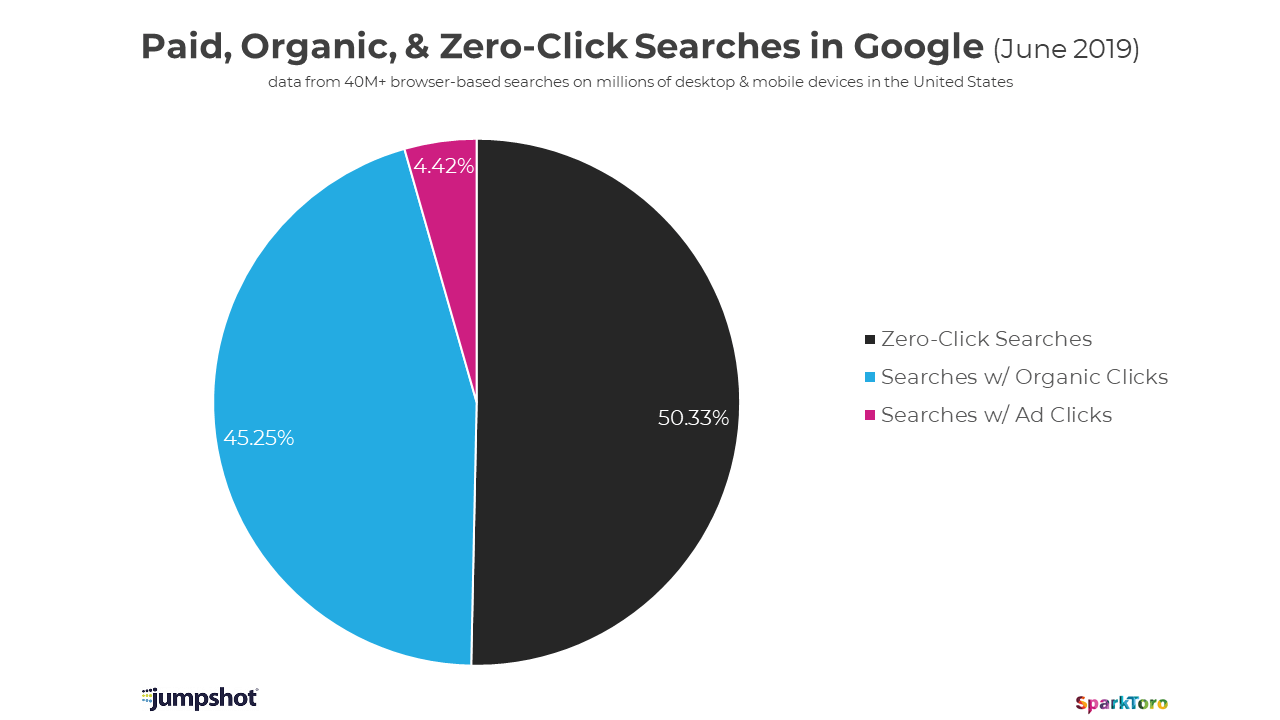Study Finds More Than 50% of Google searches End Without a Click
This new article from Search Engine Land reports on a study carried out by Rand Fishkin, founder of SparkToro. Apparently, zero-click searches just went through the 50% barrier, and he predicts that the rate isn’t going to drop.
“Zero-click searches …. have been on a steady rise for years, and I don’t expect that to reverse or plateau anytime soon,” he said about the findings of his Google clickstream data study, published on Tuesday. New data provided by Jumpshot confirmed that back in June, for the first time, most Google searches (50.33%) ended without a click through to an organic or paid search result.

Source: SparkToro
Fishkin’s first study, carried out in summer, found that the trend is upward. 49% of searches in the first three months of this year were zero-click, and that was up from 43.9% in 2016’s first quarter. The study found that most zero-click searching happens on mobile devices – and that’s where searching is carried out most.
This latest update extends to the second quarter of 2019, where the zero-click rate was 49.76%. By June, the rate had passed the 50% mark. What that means is most Google searches ended on the results page.
What’s more, the study estimates 94% of all US searches happen on a Google property – think Images, YouTube, and Google Maps. Fishkin says, “That makes Google a clear monopoly in search.” Fishkin is due to discuss these trends in a keynote speech at SMX East in New York City this November.
It seems that even though more Google searches now end without a click through to paid or organic content, Google continues to send a steady number of searchers to other Alphabet-owned concerns.
What Does 50%+ Zero-Click Mean for SEO and Paid Search?
Fishkin thinks that the future of paid search is in the hands of Google. “I think paid search CTR will probably decline over the next few months,” he told Search Engine Land. “That’s because historically, each time Google changes how paid ads appear in the search results (like the late May shift to the black ‘Ad’ labels in mobile SERPs), ad CTR rises, then slowly declines as more searchers get familiar with the ad format and develop ad blindness.”
“As searchers get wise to paid ads, we may see more clicks to organic results,” said Fishkin, adding, “Google may also create new ways to get searchers to click on ads.”
So, what do you guys think? Do zero-click searches mean zero opportunity? Fishkin makes a good point in this piece about how advertising was traditionally about awareness and sharing information about products and services. Is it time to get less obsessed with CTR?
Zero-click searching has been steadily rising, and now we’re seeing a situation where marketing opportunities, based on traditional SEO objectives, are being limited. Do we need to take a new view on what we achieve from SERPs?
As Fishkin puts it, “Rich information appearing in Google’s results may be, like billboard ads or press mentions, harder to track than website traffic, but it’s still exposing your brand name to an audience, building familiarity, and sharing information. In my opinion, the brands that find ways to benefit from that type of SERP exposure, even without a click, will be the ones who win at this new form of on-SERP SEO.”

